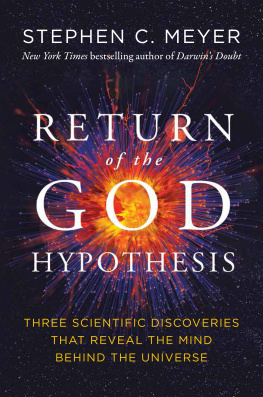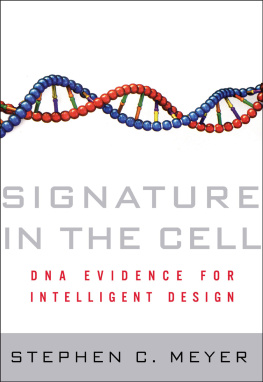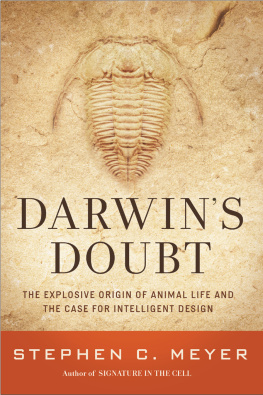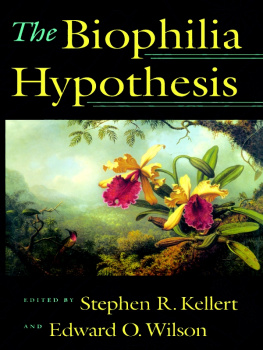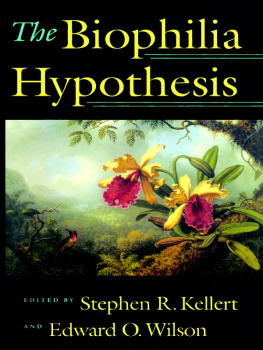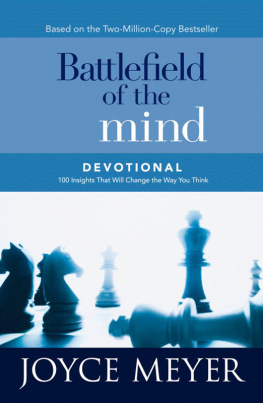Stephen C. Meyer - Return of the God Hypothesis
Here you can read online Stephen C. Meyer - Return of the God Hypothesis full text of the book (entire story) in english for free. Download pdf and epub, get meaning, cover and reviews about this ebook. year: 2021, publisher: HarperOne, genre: Religion. Description of the work, (preface) as well as reviews are available. Best literature library LitArk.com created for fans of good reading and offers a wide selection of genres:
Romance novel
Science fiction
Adventure
Detective
Science
History
Home and family
Prose
Art
Politics
Computer
Non-fiction
Religion
Business
Children
Humor
Choose a favorite category and find really read worthwhile books. Enjoy immersion in the world of imagination, feel the emotions of the characters or learn something new for yourself, make an fascinating discovery.
- Book:Return of the God Hypothesis
- Author:
- Publisher:HarperOne
- Genre:
- Year:2021
- Rating:5 / 5
- Favourites:Add to favourites
- Your mark:
- 100
- 1
- 2
- 3
- 4
- 5
Return of the God Hypothesis: summary, description and annotation
We offer to read an annotation, description, summary or preface (depends on what the author of the book "Return of the God Hypothesis" wrote himself). If you haven't found the necessary information about the book — write in the comments, we will try to find it.
Return of the God Hypothesis — read online for free the complete book (whole text) full work
Below is the text of the book, divided by pages. System saving the place of the last page read, allows you to conveniently read the book "Return of the God Hypothesis" online for free, without having to search again every time where you left off. Put a bookmark, and you can go to the page where you finished reading at any time.
Font size:
Interval:
Bookmark:
To my mother, Patricia Meyer,
who first affirmed my philosophical interests;
to my father, Charles Meyer, who challenged
me to develop greater mathematical and
scientific proficiency; and to my wife, Elaine,
whose willingness to step out on faith has
made the whole adventure possible.
It was a public speakers nightmare unfolding at a most inauspicious time. Eighteen minutes into my opening statement in a debate with physicist Lawrence Krauss, Americas most prominent scientific atheist, I suddenly found I could no longer read my own PowerPoint slides. The brightly colored swirls, or aurasfor me a telltale sign of the onset of a debilitating migrainehad begun to fill my visual field as I looked out through the blaze of lights behind the video cameras in a packed auditorium at the University of Toronto.
Intense light had often been a common migraine trigger for me, and it certainly was on that night in March 2016. As the auras spread, I began having trouble seeing not only the quotations and scientific diagrams on my slides, but Professor Krauss himself and the audience as well. Other neurological symptomsnumbness in my fingers and tongue, my voice echoing in my own head, and a difficulty finding words (aphasia)followed predictably in rapid succession.
I was able to make it through the remaining seven minutes of my presentation by speaking more slowly and deliberately than I usually do and in some cases by using less technical words. But as I descended from the podium and was taken to a dark room, I felt both disoriented and disappointed. I realized it would now be difficult for me to say much in the ensuing roundtable (following a third speaker) about the main question of the forum, the one I specifically came to discuss.
The organizers of the forum had chosen the topic: Whats Behind It All? God, Science, and the Universe. Professor Krauss, then of Arizona State University, and I were a logical match to discuss this question from opposing points of view. Indeed, he and I had debated twice before, and I had often debated other scientific atheists during the preceding decade.
Krauss, who spoke first, had a reputation not only as an accomplished physicist, but also as a bold and outspoken controversialistone with a talent for explaining scientific ideas to popular audiences. He is also well known for his provocative thesis that quantum physics can explain how the universe came into being from nothing. But that evening he didnt begin with a defense of that position. Instead, he began by declaring the topic of the forum unworthy of reflection and by characterizing me as unworthy of engagement. Indeed, he began the debate indulging in nearly ten minutes of what his boisterous supporters clearly regarded as deliciously personal invective, denouncing both me and, by extension, the organizers of the forum.
If you appear on stage with someone talking about these ideas, it gives the impression that the ideas are worth debating or that the person is worth debating, Professor Krauss declared. In this case, neither is true.
When a rival in debate descends to ad hominem argument, I usually find myself surprised at his willingness to waste allotted time. Audiences typically find insults masquerading as arguments unpersuasive. Moreover, in a debate it usually takes little to defang such tactics beyond pointing them out. That night, however, Krausss celebrity status had attracted hundreds of raucous supporters who laughed loudly at his punch lines, leaving me with the impression that an appeal to reason alone might not win the evening. As I began to speak, I pointed out that Krauss had provided little evidence to support his critique of my views, and still less in support of his own. Ordinarily, I might have also made light of his use of the ad hominem tactic, but on that night humor escaped me as my neurological distress grew progressively more acute while standing before a large audience in the auditorium and an estimated sixty thousand people watching online.
I had accepted the challenge of the debate in part to explain my own position about what science can tell us about the existence of God. This is, needless to say, an ultimate question and a subject of urgent concern for many thoughtful people. It is an important topic, as even many atheists would agree, and deserves a serious response. And although I sought to offer one that night, after the migraine set in I knew my ability to do so would be significantly limitedthough, as it turned out, the cloud of my diminished condition would come with a silver lining.
For the debate I had planned, first, to explain my core argument for the intelligent design of life and then, in the ensuing discussion, to address a question I am often asked: Who is the intelligent designer that you think is responsible for life? I also meant to address a closely related question: What does scientific evidence imply about the existence of God?or as the organizers of the forum put it: What lies behind it all?
Krauss answers that question with an emphatic Nothingor at least nothing but the laws of physics. Though he denounces philosophy as a vacuous enterprise, he publicly advocates a philosophy that scholars call scientific materialisman atheistic worldview affirmed by those who claim that science undermines belief in God.
Like other worldviews, scientific materialism attempts to answer some basic questions about ultimate realityquestions about human nature, morality and ethics, the basis of human knowledge, and even what happens to human beings at death. Most fundamentally, scientific materialism offers an answer to the question, What is the entity or the process from which everything else came?
Scientific materialists have traditionally answered that question by affirming that matter, energy, and/or the laws of physics are the entities from which everything else came and that those entities have existed from eternity past as the uncreated foundation of all that exists. Matter, energy, and physical laws are, therefore, viewed by materialists as self-existent.
Similarly, materialists hold that matter and energy organized themselves by various strictly naturalistic processes to produce all the complex forms of life we see today. This means scientific materialists also deny that a creator or designing intelligence played any role in the origin of the universe or life. Because materialists think that matter and energy are the foundational realities from which all else comes, they deny the existence of immaterial entities such as God, free will, the human soul, and even the human mind conceived as an entity in some way distinct from the physiological processes at work in the brain.
Materialism is a venerable worldview with a long history going back to ancient Greece. It has had many prominent intellectual proponents, including Democritus, Thomas Hobbes, Charles Darwin, Ernst Haeckel, Bertrand Russell, and Francis Crick.
In recent years, powerful voices have popularized scientific materialism. Beginning about 2006 a group of scientists and philosophers known as the New Atheists ignited a worldwide publishing sensation. A series of bestselling books, led by Richard Dawkinss The God Delusion, argued that science properly understood undermines belief in God. Other booksby Victor Stenger, Sam Harris, Christopher Hitchens, Daniel Dennett, Stephen Hawking, and Krauss himselffollowed suit.
In 2014 the Fox and National Geographic television networks aired a revamped version of a famous 1980 series with physicist Carl Sagan, Cosmos: A Personal Voyage. The new series, Cosmos: A Spacetime Odyssey, hosted by astrophysicist Neil deGrasse Tyson, began by replaying the audio of Sagans memorable materialistic creed from the original series: The cosmos is all that is, or ever was, or ever will be.
Font size:
Interval:
Bookmark:
Similar books «Return of the God Hypothesis»
Look at similar books to Return of the God Hypothesis. We have selected literature similar in name and meaning in the hope of providing readers with more options to find new, interesting, not yet read works.
Discussion, reviews of the book Return of the God Hypothesis and just readers' own opinions. Leave your comments, write what you think about the work, its meaning or the main characters. Specify what exactly you liked and what you didn't like, and why you think so.

